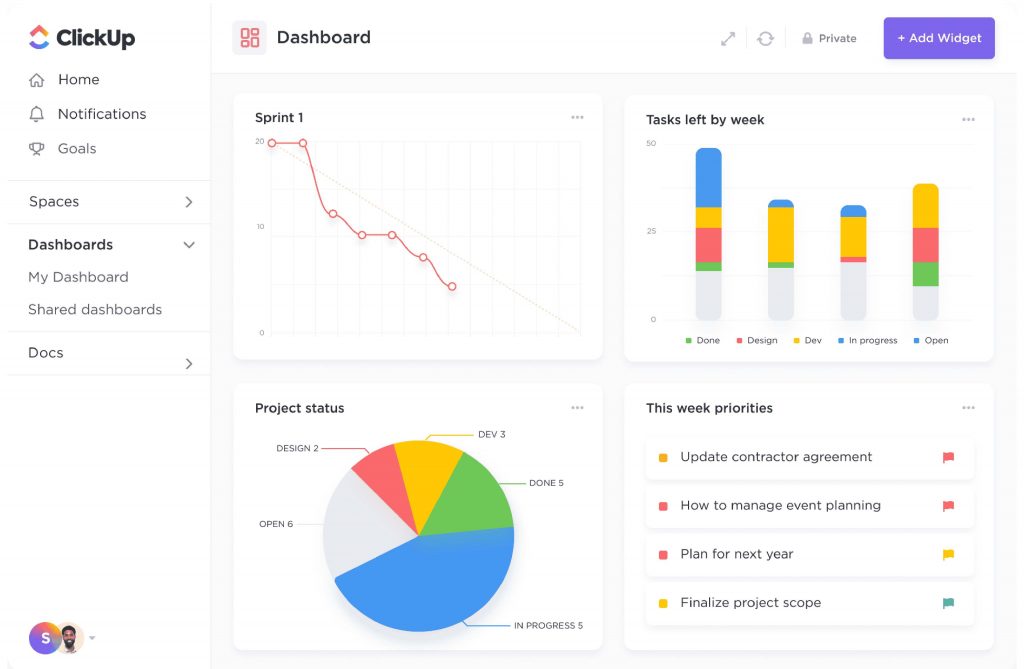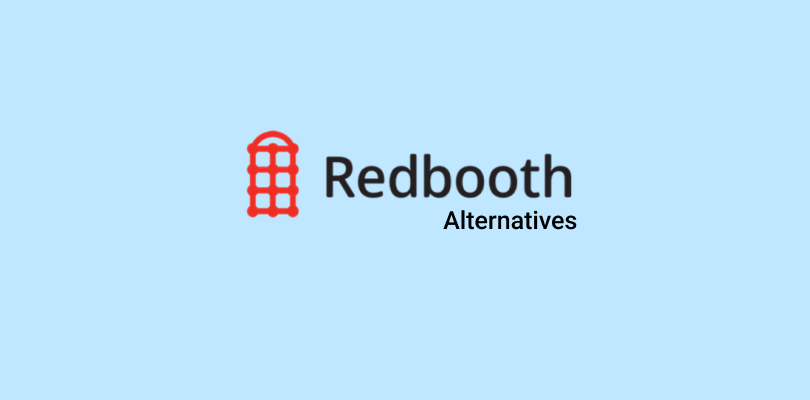ProofHub is known for its reputation for project management and collaboration. And not to forget about its built-in proofing tools, which I personally like, as well.
But here’s the question: Are their proofing tools worth it?
I mean for project management and team collaboration alone, plenty of ProofHub alternatives come with a better overall package.
So, if you’re ready to explore your options and find a better fit for your business, this blog is all you need. Here, I compared the 10 best ProofHub alternatives and competitors that excel in project management and team collaboration.
Have a look at the names –
| ProofHub Alternatives | Best For | Pricing Starts From |
|---|---|---|
| ProProfs Project | Planning, Collaborating & Delivering Projects on Time | Forever Free for small teams. Paid starts at $39.97/month/unlimited users |
| Smartsheet | Real-Time Project Collaboration | $9/member/month |
| ClickUp | Generating Detailed Reports | $7/user/month |
| Basecamp | Remote Work Collaboration | $15/user/month |
| monday.com | Managing Project Resources | $27/month/3 seats |
| Slack | Team Communication & Collaboration | $4.38/month |
| Asana | Strategic Project Planning | $10.99/user/month |
| Teamwork.com | Client Management | $10.99/user/month (3 users minimum) |
| Wrike | Automating Administrative Workflows | $10/user/month |
| Nifty | Project Portfolio Management | $39/month/10 members |
What Is ProofHub?
ProofHub is a cloud-based project management and team collaboration software that helps teams of all sizes manage their work, collaborate on projects, and communicate effectively in one central location.
(Image source: ProofHub)
The software is widely used by small businesses, creative agencies, and growing teams. It offers customizable workflows and role-based access for enhanced flexibility.
Why You May Need an Alternative to ProofHub?
So, why do you even need to shift to a different project management software from ProofHub? What could possibly go wrong with the software?
Well, if you’ve used the software, you must have encountered one or another of the issues I’ve listed below. In fact, I also checked user feedback on software review sites and found the same.
Let’s have a closer look at them below –
- Inflexible Task Dependencies: Some users have noted that ProofHub lacks advanced task dependency options. This can be a significant hindrance if your team relies on managing complex workflows.
- Overwhelming Notifications: User feedback highlights that ProofHub’s notifications system can flood inboxes, causing distractions sometimes.
- Technical Issues: Some users reported issues with intra-team communication and collaboration, which hints at technical errors.
- Scaling Issues for Big Teams: Teams managing hundreds of projects have mentioned the interface gets cluttered, and navigating through tasks becomes unmanageable without additional filtering or search options.
- Unintuitive Time Tracking: Some users found the time tracking tool unuser-friendly. Its limited integration into the task workflow made it hard to track billable hours seamlessly.
- Flat-Fee Pricing, but…: It has flat-fee pricing, which is applaudable. However, it doesn’t offer a free plan and misses out on many features (custom roles, workflows, white labeling, etc.) in the base plan.
| Looking for the Top 3 Picks From the List?So, which ProofHub alternative & competitor would I pick for myself? Well, I’ll leave the decision to you, but here are my top three picks –ProProfs Project: It is a cost-effective ProofHub alternative with collaboration tools, time tracking, task prioritization, and unlimited projects—even in the free plan. Simple and feature-rich, it’s perfect for startups and SMBs.Basecamp: The software simplifies remote team management with tools like message boards, group to-dos, and daily check-ins. It separates team discussions from client feedback and ensures clear deadlines and responsibilities.Nifty: It has project portfolio management with tools like milestones, roadmaps, and centralized tracking. Its real-time chat and document sharing enhance team collaboration.You can always check the complete comparison below for a detailed review of these tools. |
List of the 10 Best ProofHub Alternatives
If you have browsed the internet, typing “ProofHub alternative & competitor,” chances are you found a bunch of software. How do you figure out which of them is a better choice?
Well, you get in touch with people in the industry with multiple tools experience. Over the last couple of months, I connected with several startups and SMBs. I got a first-hand idea of what tools they’d prefer as a ProofHub alternative and why.
And that’s where I started my self-research to bring you this exhaustive comparison below. Let’s get started.
1. ProProfs Project – Best for Planning, Collaborating & Delivering Projects on Time
What Is Project Management? How to Manage Projects Online With ProProfs Project
If you are a startup or an SMB looking to shift from ProofHub, ProProfs Project is one of the most easy-to-use platforms with built-in collaboration tools like seamless file sharing, shared calendars, in-app discussions, @mentions, etc.
I like how it simplifies project management without unnecessary complexity. And that starts right from the free plan. They’ve managed to offer everything in there for micro teams—unlimited projects, storage, expert-designed templates, automation, reports, and more.
The software’s hassle-free time-tracking and task-prioritization features are effective for managing lean resources. One of my favorite use cases involved generating project timelines; it ensured all deliverables stayed on schedule.
In my opinion, it’s a strong choice for businesses looking for a cost-effective, feature-rich alternative to ProofHub.
What You’ll Like:
- Gantt charts for scheduling and visualizing project timelines
- 24/7 awesome customer support and ready-to-access help articles
- Automated invoice generation to quickly create project estimates
- Resource management to optimize team workload and availability
- Real-time alerts and notifications to keep you updated on project changes
What You May Not Like:
- Dark user interface option is not available
- No dedicated account manager for the free plan, unlike paid
Pricing:
Forever Free for small teams. Paid options start from $39.97/month.
User Ratings:
- G2: 4.4 out of 5
- Capterra: 4.7 out of 5
2. Smartsheet – Best for Real-Time Project Collaboration
(Image source: Smartsheet)
If you become nostalgic when you hear spreadsheets, this ProofHub competitor should catch your eye. Smartsheet is a dynamic tool for project teams that need seamless collaboration.
I explored its workflow automation, and it effectively minimizes manual work. The platform supports real-time updates, so everyone stays aligned on tasks and deadlines.
For example, I once tracked a multi-phase project where Smartsheet’s dashboards informed stakeholders about progress at every stage. Its range of views, including grid, card, and calendar layouts, makes managing diverse workflows straightforward.
What sets it apart is the ability to set permissions for secure collaboration without compromising accessibility. I just wish the company didn’t discontinue their free plan.
What You’ll Like:
- ‘Forms’ to collect information and trigger workflows
- Resource management to track budgets and manage workloads
- Activity logs track project updates, comments, and attachments
- Customizable reports to track progress and identify bottlenecks
- Data can be shared in various formats like spreadsheets, charts, and reports
What You May Not Like:
- No team workload tracking or timeline view in the base plan
- Some users find managing projects with numerous tasks, subtasks, and dependencies challenging
Pricing:
Starts at $9/member/month.
User Ratings:
- G2: 4.4 out of 5
- Capterra: 4.5 out of 5
3. ClickUp – Best for Generating Detailed Reports
(Image source: ClickUp)
ClickUp is packed with features for teams seeking robust reporting tools. I like its customizable dashboards. They work wonders when breaking down complex data into manageable insights.
You can customize these reports to suit your specific needs. Need a visual representation of your team’s workload? Want to drill down into the details of a specific task? The tool can do that for you.
The software also offers detailed time tracking, task completion charts, and workload overviews for effective project evaluation. ClickUp’s reporting extends beyond projects, integrating resource management and forecasting for effective planning.
What You’ll Like:
- ‘Whiteboards’ to visualize workflows and create mind maps
- ‘Goals’ to track your progress against your objectives
- ‘Mind Maps’ feature to generate ideas, visualize concepts, and create plans
- Table view to see work in a spreadsheet-like format
- Chat functionality to communicate with your team members
What You May Not Like:
- No resource management or time tracking in the free plan
- Some users report spending excessive time configuring settings because of too many customization options
Pricing:
A free plan is available with limited file storage space. Paid options start from $7/user/month.
User Ratings:
- G2: 4.7 out of 5
- Capterra: 4.6 out of 5
4. Basecamp – Best for Remote Work Collaboration
(Image source: Basecamp)
Managing remote teams can be tricky, but Basecamp simplifies it. The platform centralizes communication with tools like message boards and group to-dos.
I’ve seen the platform work pretty well with distributed teams using its task management system. Its system clearly shows deadlines and responsibilities, and the daily check-in feature reduces the need for constant meetings.
Another advantage is that it separates team discussions and client feedback, essentially preventing unnecessary overlap. The client-specific access feature simplifies feedback loops for external stakeholders.
What You’ll Like:
- A timesheet add-on is available for tracking work hours
- ‘Mission Control’ provides a central place to manage projects
- Kanban-style boards can be used to visualize workflows
- Automatic check-ins to collect regular updates from the team
- ‘Hill charts’ visualize progress toward milestones
What You May Not Like:
- The basic plan may not be ideal for growing teams
- Some users mention challenges with onboarding external clients and managing permissions
Pricing:
Starts at $15/user/month.
User Ratings:
- G2: 4.1 out of 5
- Capterra: 4.3 out of 5
5. monday.com – Best for Managing Project Resources
(Image source: monday.com)
Resource management becomes less daunting with monday.com. You can easily allocate workloads, track progress, and ensure deadlines are realistic.
I’ve used its dependency management feature to ensure timelines remained clear, even during overlapping tasks. What impressed me is how quickly team members can adapt using its resource dashboards, which provide insights into project efficiency.
From workload balancing to tracking expenses, the software supports informed decision-making. It also has time-tracking capabilities to manage resources effectively by revealing where delays occur.
What You’ll Like:
- Pre-built templates for various project types and use cases
- Workload views to visualize and optimize team capacity
- Customizable notifications to keep users informed about project updates
- Offers a variety of views, including Kanban, Gantt, and calendar
- Supports agile project management methodologies
What You May Not Like:
- Paid plans require purchasing for at least 3 users
- Some users have mentioned that it’s challenging to control who sees specific columns within a board
Pricing:
A free plan is available for up to 2 seats. Paid options start from $27/month/3 seats (at $9/seat).
User Ratings:
- G2: 4.7 out of 5
- Capterra: 4.6 out of 5
6. Slack – Best for Team Communication & Collaboration
(Image source: Slack)
Slack is a go-to for keeping teams connected. Its channel-based messaging system separates conversations by project. Its channel-based messaging system separates conversations by project, an excellent feature that makes communication easy to navigate.
You can create dedicated channels for different projects, facilitating focused discussions and file sharing. I’ve worked with teams using its file-sharing feature for document exchanges without relying on emails.
Notifications ensure updates aren’t missed, even in larger projects with multiple threads. Our team could also set reminders to ensure follow-ups happen as planned.
All in all, Slack can be a decent ProofHub alternative if you’re really looking to focus on team communication.
What You’ll Like:
- ‘Connect’ enables collaboration with external partners and clients
- ‘Huddles’ facilitates quick audio-video conversations for instant communication
- ‘Clips’ for recording and sharing of video and audio updates
- Workflow builder automates routine tasks and processes
- ‘Canvas’ provides a space for creating dynamic documents with rich media
What You May Not Like:
- No templates and workflow builders in the free plan
- Some users say that finding specific information, especially in busy channels with a long history, is challenging
Pricing:
A free plan is available with limited days of message history. Paid options start from $4.38/month.
User Ratings:
- G2: 4.5 out of 5
- Capterra: 4.7 out of 5
7. Asana – Best for Strategic Project Planning
(Image source: Asana Academy)
Asana keeps teams organized with its task and project management features.
From my perspective, its greatest strength is its ability to support strategic planning. Its timeline view provides a clear framework for setting goals, defining milestones, and outlining the steps needed to achieve them.
The software lets you break down complex goals into smaller, actionable tasks. The tool also tracks task dependencies, which saves you from overlooking critical deadlines.
Besides that, progress tracking through boards and lists keeps everyone aligned. It is an excellent fit for teams aiming to plan and execute long-term projects effectively.
What You’ll Like:
- Custom fields to tailor projects and tasks with relevant information
- Goals can be set and tracked to align teams with company objectives
- Portfolios offer a high-level overview of multiple projects
- ‘Approvals’ for a structured process for reviewing and approving work
- Milestones mark key achievements and progress points within projects
What You May Not Like:
- Users frequently report frustration with the tool’s basic dependency features
- No project dashboards in the free plan
Pricing:
A free plan is available for up to 10 teammates. Paid options start from $6.92/user/month.
User Ratings:
- G2: 4.4 out of 5
- Capterra: 4.5 out of 5
8. Teamwork.com – Best for Client Management
(Image source: Teamwork.com Support Center)
Teamwork.com simplifies managing client projects by keeping everything transparent. You’ll notice its client portal feature is a big help for teams sharing updates directly with clients.
Besides that, you can assign tasks, prioritize them, and track them in real time. I’ve seen teams use its time-tracking tool to bill clients accurately for their work hours. This is a helpful feature for most teams.
With Teamwork.com, project-related files, messages, and milestones are stored centrally. This largely reduces back-and-forth communication, particularly useful for agencies that manage multiple clients.
What You’ll Like:
- A wide array of templates for various project types and use cases
- Workload capacity planning to visualize and optimize resource allocation
- Project portfolio management for a high-level overview of all projects
- Risk register for identifying and managing potential project risks
- Teamwork CRM integration to connect project data with CRM
What You May Not Like:
- No reports and workload management features in the base plan
- Users pointed out that the recurring task functionality could be improved
Pricing:
Starts at $10.99/user/month (3 users minimum).
User Ratings:
- G2: 4.4 out of 5
- Capterra: 4.5 out of 5
9. Wrike – Best for Automating Administrative Workflows
(Image source: Wrike)
Wrike simplifies administrative tasks by automating complex workflows. It offers a range of automation features, including custom workflows, request forms, and automated approvals.
For example, you can create a workflow that automatically assigns tasks to team members based on certain criteria or set up a request form to standardize the intake of new projects.
Or, say you want to automate the process of onboarding new clients. By creating a custom workflow, you can automatically assign tasks to everyone in the team. This ensures each new client receives a consistent and efficient onboarding experience.
The platform’s workload balancing tools help you distribute tasks effectively, avoiding burnout. I also liked the detailed analytics, which provides actionable insights.
What You’ll Like:
- Gantt charts to visualize project schedules and track progress
- Kanban boards for a visual overview of tasks and their status
- Customizable request forms for the intake of information and requests
- Automated approvals for a structured review and approval process
- Advanced analytics for informed decision-making
What You May Not Like:
- Only 2 GB storage space per account in the free plan
- Some users feel the interface is overwhelming, difficult to navigate
Pricing:
A free plan is available with limited storage space. Paid options start from $10/user/month.
User Ratings:
- G2: 4.2 out of 5
- Capterra: 4.3 out of 5
10. Nifty – Best for Project Portfolio Management
(Image source: Nifty)
Nifty excels in providing a clear overview of your entire project portfolio. This can be incredibly helpful for project managers who need to track progress across multiple projects.
The software centralizes project planning and tracking, simplifying portfolio oversight. Its milestones feature is especially useful for breaking long-term goals into achievable stages.
You can create roadmaps to visualize timelines and align tasks with objectives. The built-in team collaboration tools, like real-time chat and document sharing, ensure seamless communication throughout projects.
What you’ll like:
- Docs provide a collaborative space for creating, sharing, and storing documents
- Milestones mark key achievements and track progress toward project goals
- Overviews offer a high-level view of project progress
- Embeds for incorporating external content and tools within Nifty
- Direct messaging and in-app notifications facilitate communication
What you may not like:
- Only 100 MB of storage space in the free plan
- Some users feel the software has basic reporting capabilities, which may not be suitable for advanced needs
Pricing:
A free plan is available for up to 2 projects. Paid options start from $39/month/10 members.
User Ratings:
- G2: 4.7 out of 5
- Capterra: 4.6 out of 5
What Should You Look for in ProofHub Alternatives?
So, now that you have explored your options, why not take a quick look at what you should look for specifically when choosing an alternative to ProofHub? I believe it’ll help you make an informed decision.
Here are some of the things that should be there in any alternative or competitor you choose –
- Free Plan: ProofHub doesn’t offer a free plan, which is something most competitors do. A free plan is always better than a trial period to test the software before investing.
- User Reviews & Ratings: Check out reviews and ratings on reputable sites to gauge overall satisfaction and any potential pain points. After all, who better to learn from than the people who use these tools day in and day out?
- Essential Features & Functionality: Explore the core features of each tool, focusing on how they can help you manage projects effectively. The goal is to go beyond the marketing hype and get a practical understanding of what each tool can do.
- API Support: This is a must because even if third-party integration is unavailable for any particular tool, you can always integrate via API.
- Ease of Use: Nobody wants to spend months learning the ABCs of complicated software. Test the tool to check how user-friendly it is, paying attention to things like the interface design and navigation.
- Customer Support: What about the quality of customer support the company offers? Is it easy to get help when you need it? Are the support resources helpful and informative?
- Value for Money: Of course, budget is always a consideration. Assess the value proposition of each tool, taking into account its features, pricing, and overall performance.
- Templates for Projects: Pre-built customizable templates for quick project setup for consistency across similar project types.
Which Is the Best ProofHub Alternative for You?
Choosing an alternative to ProofHub for project management is not difficult once you determine your immediate or long-term requirements. And it is a subjective thing. Why?
You see, while my business might focus on software that ticks all the boxes, has a generous free plan, and is user-friendly, your business might need a platform for something completely different.
Let’s say you are looking for a perfect fit for your small business. You’d definitely choose a platform like ProProfs Project.
But does that mean you make a paid contract straightaway? Absolutely not.
While figuring out your priorities is important, next, it’s all about testing different software options. So, instead of making an investment, you should first use their free plan, which doesn’t require you to pay a penny or update payment details.
Just sign up and see if the tool is good enough to take you to new heights where PoofHub had left off.
FREE. All Features. FOREVER!
Try our Forever FREE account with all premium features!



